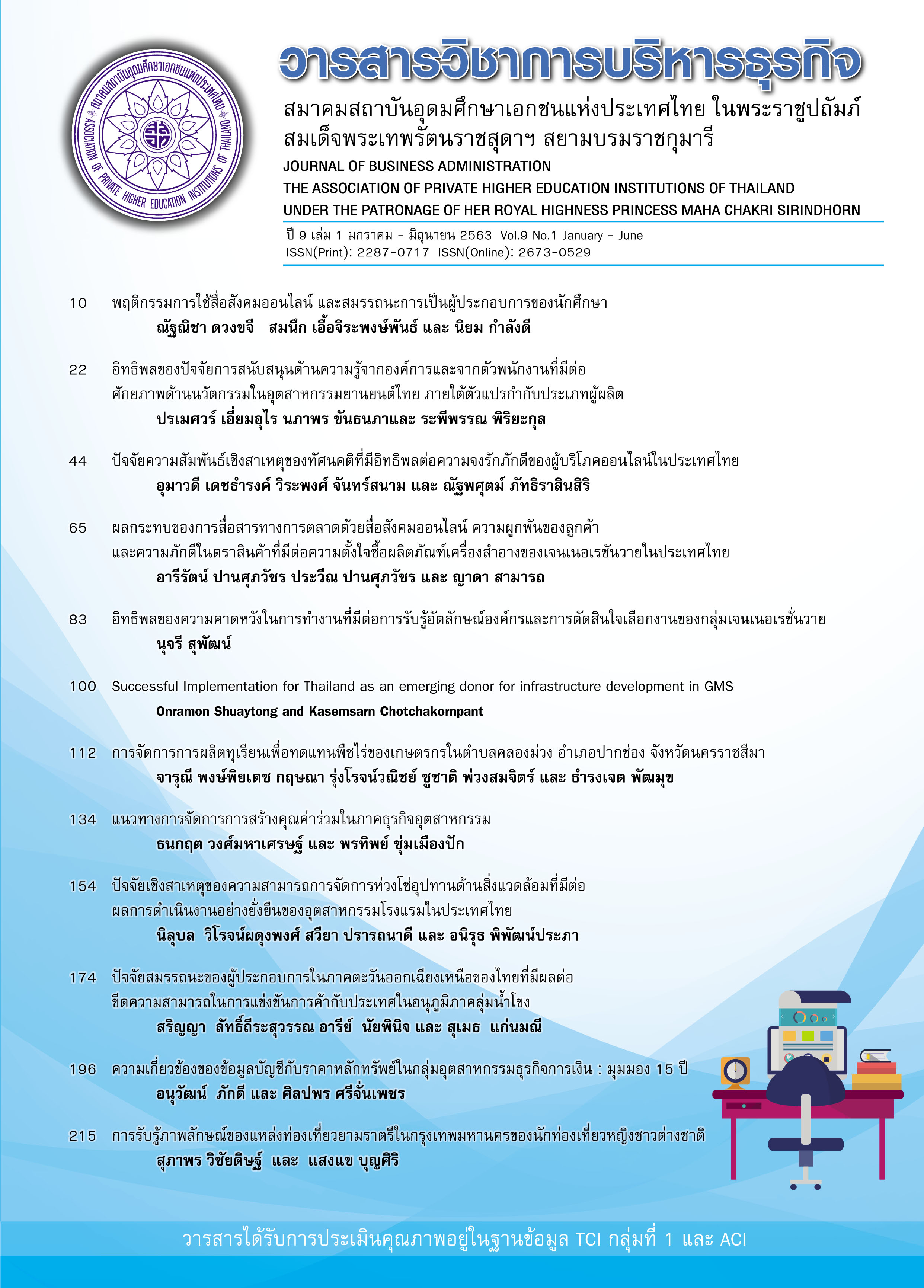Online Social Media Usage Behavior and Entrepreneurship Competencies of Students
Keywords:
Behavior, Online Social media, Student, EntrepreneurshipAbstract
This research aimed to study behavior for using online social media and entrepreneurship
competencies of students. The population of this research was 340 undergraduate students from
Walailak University. Data were collected by online questionnaires and analyzed by using a
computer program package. Statistical data analysis tools were frequency, percentage, mean,
standard deviation, and Chi-square.
The results were shown that students had used online social media such as Youtube,
Facebook, LINE and Instagram every day. It indicates that social media plays an important role in
all aspects of student life. Students had a high level of entrepreneurship competencies. The results
of the study indicate the importance of promoting entrepreneurial skills to students and pushing
students to experience with future business opportunities. And the results also were found that
school of students and behavior for using online social media in LINE and Twitter are related to
entrepreneurship competencies of students, statistically significant at 0.05. As well as educational
institutions to improve the curriculum, teaching and learning process through social media to
develop entrepreneurship competencies of their students that is the policy of human resource
development of our country in the digital age.
References
Boyles, T. (2012). 21st Century Knowledge, Skills and abilities and Entrepreneurial Competencies: A Model for Undergraduate Entrepreneurship Education. Journal of Entrepreneurship Education, 15, 41-56.
Choosin, C. (2016). Entrepreneurial Potential of Undergraduate Students in Faculty of Business Administration, one of University towards Entering the ASEAN Economic Community. Payap University Journal, 26(1), 233-254.
Decharin, P. (2017). People behavior with social media. Retrieved from https://www.bangkokbiznews.com/blog/detail/641565
Electronic Transactions Development Agency. (2018). Thailand Internet User Profile 2018. Retrieved from https://www.etda.or.th/publishing-detail/thailand-internet-user-profile-2018.html
Gavino, M. C., Williams, D., Jacobson, D., & Smith, I. (2019). Latino entrepreneurs and social media adoption: personal and business social network platforms. Management Research Review, 42(4), 469-494. DOI: 10.1108/MRR-02-2018-0095
Ketasingha, W. (1995). Mean values and interpretation. Educational Research News, 18(3), 8 -11.
Kosajyawat, S. (2008).The National Children’s Day: Development and Importance to Human Resource Development. Journal of Education and Social Development, 4(2), 1-17.
Mladkova, L. (2016). Academic Environment from The Perspective of Generation Z students. In S. Pavla (Ed.), Knowledge for Market Use 2016: Our Interconnected and Divided World, (pp.306-312). Olomouc: Palacky University.
Nawi, N. B. C., Mamun, A. A., Nasir, N. A. B. M., Shokery, N. M., Raston, N. B., & Fazal, S. A. (2017). Acceptance and usage of social media as a platform among student entrepreneurs. Journal of Small Business and Enterprise Development, 24(2), 375-393. DOI: 10.1108/jsbed-09-2016-0136
Panlak, K., & Sirisuthikul, V. (2018). Relationship between Content Marketing on Instagram and Engagement and Brand Equity of Japan Apparel Brand from the Point of View of M Generation’s in Thailand. Journal of Business Administration, 7 (special 2), 10-29.
Parveen, F., Jaafar, N. I., & Ainin, S.(2016). Social media’s impact on organizational performance and entrepreneurial orientation in organizations. Management Decision, 54(9), 2208-2234. DOI: 10.1108/md-08-2015-0336
Siamphone. (2019). 4 reasons why Thai people use Twitter. Retrieved from: https://news.siamphone.com/news-40799.html
Shatto, B., & Erwin, K. (2016). Moving on From Millennial: Preparing for Generation Z. Journal of Continuing Education in Nursing, 47(6), 253-254.DOI: 10.3928/00220124-20160518-05
The Knowledge Management Institute Foundation. (2016). Thailand 4.0. Retrieved from https://waa.inter.nstda.or.th/stks/pub/2017/20171114-draeqa-blueprint.pdf
The Ontario Public Service. (2016). 21st Century Competencies. Retrieved from http://www.edugains.ca/resources21CL/About21stCentury/21CL_21stCenturyCompetencies.pdf
Turan, M., & Kara, A. (2018). Online social media usage behavior of entrepreneurs in an emerging market: Reasons, expected benefits and intentions. Journal of Research in Marketing and Entrepreneurship, 20(2), 273-291. DOI:10.1108/jrme-09-2016-0034
Vashararangsi, P. (2017). The Students Competencies and Attributes as Entrepreneurs in MBA Program in Benjamitr Universities Consortium. Journal of Humanities and Social Sciences Rajapruk University, 3(2), 116-126.
Vongmahasetha,T. (2018). Content Marketing Exposure of Online Consumers in Bangkok Area. Journal of Business Administration, 7 (special 1), 85-94.
Downloads
Published
How to Cite
Issue
Section
License
บทความที่ลงตีพิมพ์ในวารสารวิชาการบริหารธุรกิจ สมาคมสถาบันอุดมศึกษาเอกชนแห่งประเทศไทยต้องเป็นบทความที่ไม่เคยได้รับการตีพิมพ์เผยแพร่ หรืออยู่ระหว่างการพิจารณาตีพิมพ์ในวารสารอื่นๆ การละเมิดลิขสิทธิ์เป็นความรับผิดชอบของผู้ส่งบทความโดยตรง


